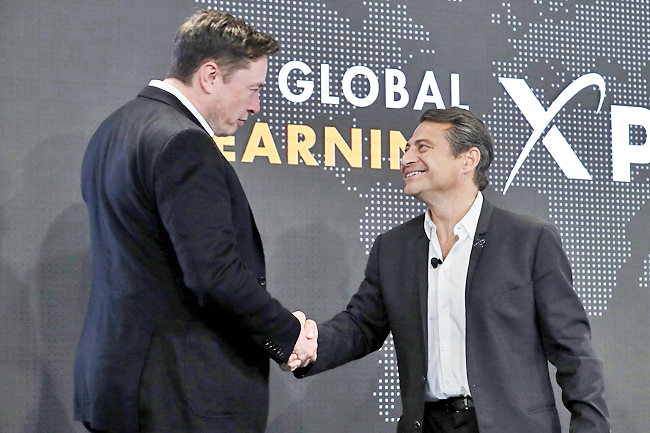CHEYENNE, WYOMING (AP) – From algae farming to producing a sort of artificial limestone, ideas for reducing greenhouse gas in the atmosphere are getting a funding boost from famed entrepreneur Elon Musk.
The Tesla electric vehicle and SpaceX rocket company developer is bankrolling a USD100 million XPRIZE Carbon Removal competition for the most promising ways to reduce atmospheric carbon dioxide by grabbing the gas right out of the air.
The 15 early-phase “milestone round” winners were announced yesterday and each will get USD1 million, a welcome boost for the teams to carry on with and scale up their work.
“What we’ve said is you haven’t given us a million bucks; what you’ve done is catalysed investment in this technology,” said CEO Mike Kelland of Planetary Technologies, a milestone winner that seeks to increase the ocean’s ability to absorb carbon dioxide by controlling the rising acidity of seawater.
The milestone winners aren’t necessarily ahead or favoured for the USD80 million in final prize money that will be awarded in three years.
Until December 1, 2023, anyone can still jump in the contest, which was announced a year ago, and potentially get a share of that money.
The final winning team or teams will need to show they can remove 1,100 tonnes (1,000 metric tonnes) of carbon dioxide from the atmosphere each year, show how much it would cost to remove up to 1.1 million tonnes (one million metric tonnes) per year and show a path to removing billions of tonnes of carbon dioxide per year. A third party will independently validate the work submitted for the grand prize to be announced on April 20, 2025.

XPRIZE announced USD5 million in carbon removal project awards to university student teams last fall.
The milestone winners announced yesterday propose a variety of ways to remove carbon dioxide through artificial means and by helping nature do much of the work herself.
Planetary Technologies isn’t looking up into the sky but down in the ocean to reduce atmospheric carbon dioxide.
The Dartmouth, Nova Scotia, Canada-based company proposes to use antacids produced from the leftovers of metal mining to make the ocean more able to absorb the greenhouse gas.
Durham, North Carolina-based 8 Rivers Capital sees ocean chemistry as a model to replicate.
The winning company seeks to trap atmospheric carbon dioxide in calcium carbonate crystals, similar to how the gas dissolved in the ocean helps form seashells and limestone.
Company spokesperson Adam Goff described the process as “poetic” in a way.
“The calcium cycle is how the earth regulates its CO2 over millions of years. We’re sort of speeding up that natural cycle,” Goff said.
Global Algae, based in Santee, California, won with a plan to cultivate algae to help restore rain forests, which capture huge volumes of carbon dioxide.
Algae can be a more efficient and more profitable alternative to the cattle ranching and soy and palm oil crops currently on cleared rain forest land, said Mark Hazlebeck, a principal of the family-owned company.
The prize announcement comes as the United Nations Intergovernmental Panel on Climate Change warns in ever-starker terms of the threat of rising global temperatures.



















































